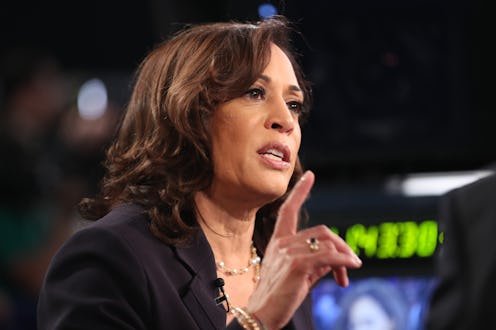News
Kamala Harris Opened Up About That Intense Debate Moment With Joe Biden

Voters who hadn't heard much about one particular California senator ahead of Thursday's debate are likely familiar with her now thanks to the fiery exchange she had with Obama's former vice president. After his campaign reportedly characterized the moment as "a low blow," Kamala Harris explained why she challenged Joe Biden on race. During an interview with CBS News, she said the moment was about "speaking truth" and recognizing the impact segregationist policies had on real people.
"It was about just speaking truth and as I've said many times, I have a great deal of respect for Joe Biden," Harris told CBS News This Morning in an interview on Friday. "He has served our country over many years in a very noble way, but he and I disagree on that."
In one of the more memorable moments of the first debate of the 2020 Democratic primary, Harris interjected herself into discussion about Biden recently promoting his past work with segregationist senators as evidence of his relationship-building skills.
"I do not believe you are a racist and I agree with you when you commit yourself to the importance of finding common ground," Harris told Biden during Thursday's debate, according to a transcript provided by Axios. "It's personal and it was hurtful to hear you talk about the reputations of two United States senators who built their reputations and career on the segregation of race in this country."
Earlier in the month, Biden discussed his past working relationship with former segregationist Sens. James Eastland and Herman Talmadge, stressing the "civility" he'd had with them. "We didn't agree on much of anything," Biden said at a fundraising event, per The Hill. "We got things done. We got it finished."
At Thursday's debate, however, Harris criticized Biden for working to oppose busing with Eastland and Talmadge. "There was a little girl in California who was part of the second class to integrate her public schools, and she was bused to school every day," she said. "That little girl was me." Her campaign team, likely having prepared for this moment, quickly shared a photo of Harris as a young child on Twitter.
Speaking to CBS News on Friday, Harris said she'd been motivated to bring up the issue because she felt it was important to have conversations centered on the real impact a policy can, or has had, on real people. "My purpose in raising my experience was to really just make sure that in this conversation we are appreciating the impact on real people of policies that have been pushed in the history of our country way back when and the affect even today," Harris said when asked what she hoped voters took away from the exchange.
"The point that I was making is, had those senators, those segregationists, had their way, I would not be a member of the United States Senate today," she said. "I would certainly not be a top contender to be president of the United States."
Harris went on to argue that discussions about race relations are not just intellectual or academic — they're also about how legislators' policies affect people. "The impact of their work was very real and it is something that when we are discussing an issue of race has to be appreciated, which is this is not just an intellectual or academic discussion," she told CBS News. "The history of race in our country had a real impact on real people."
When asked specifically about CBS News journalist Ed O'Keefe's report that Biden's campaign considered Harris' comments at Thursday's debate to be "a low blow," Harris said political campaigns and debates are bound to include discussions in which candidates' views differ. "On this issue, I guess it's evident that there is a contrast of opinion on the significance of people who have served in the United States Senate and what they've done in terms of their policies," she said.